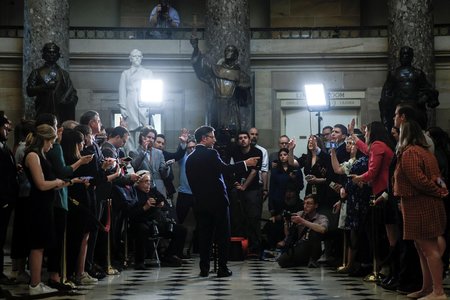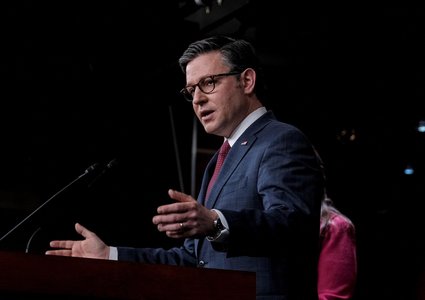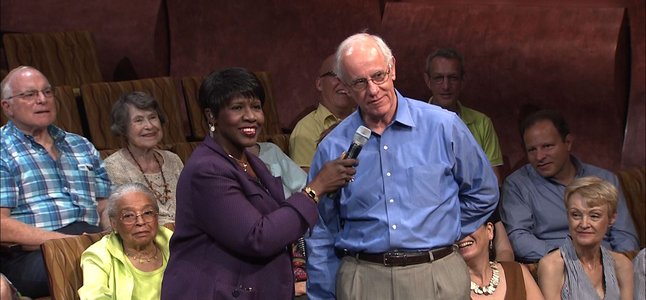The Republican National Convention ended with Donald Trump accepting the Republican Party's nomination for president, but was Trump able to successfully reframe his message to broaden his appeal before the general election? Meanwhile, the Democrats are preparing for their nominating convention in Philadelphia, and nominee-to-be Hillary Clinton named Virginia Sen. Tim Kaine as her running mate late Friday night. Can Clinton successfully use the DNC to build trust in her campaign?
Full Episode: Washington Week in Philadelphia: Trump accepts Republican nomination and Clinton prepares for DNC
Jul. 22, 2016 AT 6:46 p.m. EDT
TRANSCRIPT
Notice: Transcripts are machine and human generated and lightly edited for accuracy. They may contain errors.
GWEN IFILL: Smack in the middle of two critical weeks in our nation’s politics, we look back at Cleveland and forward to Philadelphia, tonight on Washington Week .
DONALD TRUMP: (From video.) I am with you. I will fight for you. And I will win for you. (Cheers, applause.)
MS. IFILL: A raucous Republican convention riddled with controversy and anger, and no small measure of dysfunction.
SENATOR TED CRUZ (R-TX): (From video.) Vote your conscience. Vote for candidates up and down the ticket who you trust.
MS. IFILL: But the Trump-Pence ticket is now in place, and the party agrees on one big thing.
INDIANA GOVERNOR MIKE PENCE (R): (From video.) Hillary Clinton will never become president of the United States of America. (Cheers.)
FORMER SECRETARY OF STATE HILLARY CLINTON: (From video.) They spent most of their time attacking me and President Obama, rather than making any kind of argument about the future we want to build.
MS. IFILL: Now, all eyes turn to Philadelphia, where the presumptive Democratic nominee gets to make her mark.
Joining me with analysis of the race for the White House, Jeanne Cummings, political editor for The Wall Street Journal ; Michael Duffy, executive editor of TIME Magazine; John Harwood, chief Washington correspondent for CNBC; and Alexis Simendinger, White House correspondent for RealClearPolitics.
ANNOUNCER: From Philadelphia, Pennsylvania, this is a special 2016 election edition of Washington Week with Gwen Ifill . Once again, from the Philadelphia Theatre Company at the Suzanne Roberts Theatre, moderator Gwen Ifill. (Applause.)
MS. IFILL: Good evening. Hello, Philadelphia, from the City of Brotherly Love, the site of next week’s Democratic National Convention. When we left Cleveland this morning, we left a party divided in the wake of a nominating convention whose new nominee painted a dark, even apocalyptic vision of America. In doing so, Donald J. Trump made it clear – from immigration to trade, to crimes against law enforcement – it’s them or it’s us.
MR. TRUMP: (From video.) I have visited the laid-off factory workers and the communities crushed by our horrible and unfair trade deals. (Cheers, applause.) These are the forgotten men and women of our country, and they are forgotten. But they’re not going be forgotten long. (Cheers, applause.) These are people who work hard, but no longer have a voice. I am your voice. (Cheers.)
MS. IFILL: It was a convention beset with the unusual Melania Trump’s oddly familiar speech, Ted Cruz’s on-stage non-endorsement, boos for senate majority leader Mitch McConnell, and whenever Hillary Clinton’s name was mentioned, chants of “lock her up.” In fact, Hillary Clinton seemed to be the organizing principal of this convention, even more so than Donald Trump, wouldn’t you say, Michael?
MICHAEL DUFFY: I think particularly on the first two days, Gwen. If you had ended that after Tuesday night, you would have thought it was the anti-Hillary convention, because they came in trying to unite the party. First, it’s a very – it’s not a big platform that they have to offer. They went with Mike Pence as a vice presidential candidate to bring in the social conservatives. But the only really organizing principle was the opponent. And that’s all really they talked about in the first two days. As they moved into the second two days, you began to hear other themes, which were not so much about Hillary but may – or we’ll just find out whether this was providing the catalyst that Donald Trump needed.
MS. IFILL: You know, Jeanne, we’ve covered a lot of – among us – we’ve covered a lot of political conventions. I don’t think I’ve ever covered one that was as singularly focused on something other than the nominee.
JEANNE CUMMINGS: It was really stunning. And I couldn’t agree with you more. I mean, usually a political convention is intended to rally the troops and to broaden the portrait of the candidate, because they’ve just come out of a primary, sometimes a nasty one, and in this case both sides had grueling primaries. And so a real goal here is this is your introduction to the broader electorate. And so they usually use them to try to reach out to independents, and to present the best portrait of the candidate.
But even in those first two nights, when Donald Trump was relying on his family to broaden the portrait, you would only get just a small vignette that was personal about their father or Melania’s husband. But then they would – they moved right into kind of pitches, or they’d echo his speech. So even those attempts were too thin to truly broaden his portrait.
MS. IFILL: But it’s not to say, Alexis, that this was a policy-free convention. There was a lot of policy. There was trade, against it, even though many of the Republicans in the room, including the running mate, are probably for free trade. Law and order, another recurring theme. What did you think punched through?
ALEXIS SIMENDINGER: Well, one of the things that struck me is the debate that’s continuing about where goeth the Republican Party? And I don’t think this convention helped to smooth out or answer any of the dynamics of where it may be going. The suggestion was that Donald Trump has single-handedly remade the Republican Party. And I’m not sure that we’re going to actually see that hold beyond November, unless he wins. If he wins, usually we expect the president of the United States to be able to enforce a kind of dynamic on his or her party.
On the trade issue, that’s unsettled. We saw the fissures right there before our eyes for a whole week. And as, you know, you’ve suggested, Jeanne, what was a unifying thing that everybody could talk about that brought that unity into that hall in Cleveland, that Donald Trump so hungered for – and he was nakedly open about his desire to try to see that rallying around him as a person, as a brand. And the unifying element was the antipathy towards Hillary Clinton.
MS. IFILL: What do you think, John? Do you think that Donald Trump is managing to take over the party or hijack the party?
JOHN HARWOOD: Well, I don’t know if I’d use the word hijack, but he has –
MS. IFILL: But I did, so it’s OK. (Laughter.)
MR. HARWOOD: Let’s put it this way, he’s grabbed the steering wheel. I think, for the reasons that Alexis mentioned, he has not demonstrated that he is going to change the course of the party. He has idiosyncratic positions that are much different from other Republicans. And, as we were discussing before, they focus on Hillary. They can’t unite around entitlement reform – he’s against it, most are for it. They can’t unite around trade, because he is to the left of Hillary Clinton on trade. Even on financial regulation – it was so interesting that they put in the platform a revival of a banking regulation that Elizabeth Warren and Bernie Sanders had been arguing for it’s called Glass-Stegall, that law. And their argument is that by taking that position, since Hillary Clinton is against reviving that boundary, that it will prove that she’s the puppet of Wall Street.
These are not things that most Republicans are going to rally to. And especially that interview he gave with The New York Times , when he declined to repeat the ironclad guarantee that the United States military would back up its NATO allies if they were threatened by Russia, that is – that is a very, very difficult pill for the Republican foreign policy establishment to swallow.
MS. IFILL: Well that was a remarkable article in The New York Times . Our pal, David Sanger, one of our Washington Week panelists, interviewed him. And one of the things that struck me most about it was how – for instance, I asked Michael Flynn, who is a retired general who’s one of his foreign policy advisors: So, if you say that you’re not willing to defend the Baltic States, who are members of NATO, and you’re not willing to defend our allies and that we are too automatically willing to do that, what does that – what about Israel? And he said, oh, we’ll always stand by Israel. Now, what was the difference? It was not clear to me. And I’m not sure it’s clear to him. It seems to me a lot that, especially when it comes to foreign policy, it’s we’ll figure it out – Turkey being a good example.
MR. DUFFY: Well, I think you can draw a direct line between – there are not a lot of votes for NATO in the United States. There are a lot of votes for Israel. So I think that what Trump was saying there is he was –
MS. IFILL: But there are Baltics country – you know, Latvians in the United States.
MR. DUFFY: Yes. There are. He may or may not think they make a difference in whatever it is – the campaign he’s running. I think what’s interesting about Trump – and you see this over again, particularly when he’s asked about foreign policy – he sort of prides himself – he said this in an interview with us – I’ve read a little about these things, but I really trust my instincts, I trust my judgment. It’s how – he’s a seat-of-the-pants businessman. He thinks he can be kind of a seat-of-the-pants presidency. And he’s not shy about saying that. And that’s part of what he’s offering. You know, so much of what he said in the speech, whether the policy was domestic or foreign, the answer was always “me.” And –
MS. IFILL: Always. In fact, I am your voice was a version of “me.”
MR. DUFFY: I’m it. And that’s the solution. The details aren’t really important. What’s important in his whole sort of deal here, is that it’s about him. And that’s the bet he’s making and he thinks that’ll work. It’s gotten him this far. And so you can’t necessarily think, just because the convention was bad, or it was ragged and jaggedy and all those things, are we really sure that’s going to, you know, suddenly upend him? It’s gotten him close and kept him there.
MS. IFILL: Well, that’s his reasoning, which is, hey, I’m here now. I’ve won 14 million votes, he’s happy to tell you. Whether that’s going to – that matters in the general election or not. But the other thing that I find interesting also is that the personalities of this convention went all over the place. Mike Pence, who’s very even-keeled. Ted Cruz, who’s not. And we basically tracked it. And then we were promised a great entertainment spectacle, which didn’t – well, not in the way they intended, I don’t think, actually happened. It was rackety-jackety, is that what you said?
MR. DUFFY: Jangly and jagged.
MS. IFILL: Whatever. (Laughter.) So does that make a difference? Is that just – were we just up in the weeds with that?
MS. CUMMINGS: Well, one of the things that I thought that this convention illustrated were how much the party is not unified, and how thin his bench is, because other than his children, we had ardent backers, and strong surrogates, in Newt Gingrich, Chris Christie, maybe Jeff Sessions, and Rudy Giuliani. And it’s just such a thin bench, that – and it is particularly so, I think, when you think about how many weapons we’re going see here in Philadelphia that Hillary Clinton has at her disposal. When you think of – there’s, of course, the candidate, her husband, the, the president, his wife, the vice president, Elizabeth Warren, and now Bernie Sanders. And they all can talk to very different constituencies. That is an amazing arsenal. I don’t think we’ve seen one that big in modern times.
MR. HARWOOD: But here, again, I think this goes to the divisions that we’re talking about. Donald Trump has a thin bench. The Republican Party doesn’t. Remember, the Republican Party field was stockpiled with governors and senators who Republicans looked at as rising stars – Scott Walker, Marco Rubio –
MS. IFILL: Who sent in a hostage video, someone described it as that. (Laughter.)
MR. HARWOOD: That’s right. But many of the young stars of the Republican Party simply didn’t want to be associated with this convention, or if they did it was very tamped down and de minimis. So it is – Donald Trump – we talked about the steering wheel. But he’s kind of unto his own. And small staff, small set of deep loyalists within the party. And we’ll see where he can get to.
MS. IFILL: I just want to turn the corner to the other thing that’s happening here in Philadelphia this week, which are the Democrats, who are coming here to nominate Hillary Clinton and her, as of this time on a Friday afternoon, where I will admit, full disclosure, that we are taping this show early – so if there’s late-breaking news about Hillary Clinton’s running mate, we don’t know it yet. But, that said, Alexis, what does the running mate decision mean for her? And what does she have to get accomplished this week?
MS. SIMENDINGER: Well, one of the things that we’re going to see in the city of brotherly love is unity, in a completely different way. We know that Secretary Clinton is trying to argue to the electorate that experience, a steady hand, is the antidote to Donald Trump – the dangerous and unscripted and, she argues, narcissistic, you know, personality brand. He’s arguing he’s the outsider, he doesn’t have to be the establishment. She is clearly going to have a convention in which we’re going to see the sitting president, a former president, her husband, the vice president. We’re going to see so much of our current establishment speaking for her.
MS. IFILL: So after a week of being called a liar, on emails, on Benghazi, and being painted with this incredibly broad brush, which really sticks for Republicans, how do you then erase that from the mind of the general public, many of whom are watching this whole thing for the first time?
MR. DUFFY: Because, if you’re Hillary Clinton, you’re thinking, well, whatever shortcomings I have, they’re tiny in comparison to the ones we face as a nation. And you can look around the country, or look around the world, and say, you know, I’m not merely the antidote to Trump. I’m the – experience counts. And I’m the solution that you’re looking for in a world of uncertainty and chaos. And I think that will be as much her message. And I think it will go to this vice presidential choice, whenever it comes, whether it’s tonight or tomorrow or the next day. I think she is someone who is going to look for a steady, uncontroversial, distinctly un-Trump-like sidekick.
And I’ll say one other thing that may or may not be in her defense. This is someone who has worked – lived, excuse me – lived and worked in the White House already for eight years, as first lady. She saw her own husband wrestle with the vice president. She found, she thought, Al Gore, was a little too invasive, a little too nettlesome, a little too meddlesome. And I don’t think we’re going to see someone along those lines. But we’ll know soon enough. That’s just –
MS. CUMMINGS: But there are risks to her with the arguments – the steady as you go and full of experience.
MS. IFILL: That’s exactly what people are rising up against this year.
MS. CUMMINGS: Absolutely. Absolutely. This is – you know, the electorate is really in a change place, and she’s not. She’s not the change candidate. That is one of the things that I think the Republicans did effectively in their convention, is make the argument that he is the change agent and she’s not. And when you look at – you know, you have the rising of the Trump, but you have the Sanders side as well. They want change.
MS. IFILL: But I heard Elizabeth –
MS. CUMMINGS: Wait. And then you’ve got these two third-party candidates.
MS. IFILL: Right.
MS. CUMMINGS: Who bleed off in different directions.
MS. IFILL: I heard Elizabeth Warren say, well, you know, the thing about it is, our problem – we may have to see the same problems, but we have solutions, whereas Donald Trump doesn’t, which is a different – yes, the electorate is angry. But we can fix it. And he’s just – you know.
MS. SIMENDINGER: You know, that’s a different argument for trust. And we know that Secretary Clinton is incredibly vulnerable in the polling on trust, as is Donald Trump – two of the most historically distrusted candidates.
MS. IFILL: It’s true.
MS. SIMENDINGER: So at this convention, if his argument was you cannot trust Hillary Clinton – she’s part of the rigged system, she’s a criminal, lock her up – all that. Part of the task and the challenge, I think, in this city for her is to use these four days to try to argue that a steady hand and deliverables to produce results – and she’s going to argue for results, whether it’s under President Clinton’s administration or perhaps under President Obama – she’s going to argue that’s a form of trust. Trust her.
MR. HARWOOD: But remember one thing about the argument that the American people are rising up and wanting to change – overturn the status quo. The campaign is going to tell us whether that is the people or the people because, remember, Hillary Clinton beat Bernie Sanders in the Democratic primary. Donald Trump won over a divided field. And Hillary Clinton is now leading Donald Trump in the polls.
MS. IFILL: Well, except the polls are still really close. And if these candidates are so different, why is it so close? I think that Democrats are beginning to worry that people are going to say, oh, well, America couldn’t possibly choose Donald Trump, so let’s relax, which scares a lot of Democrats.
MR. DUFFY: Well, we – I think one of the things that the polls tell you is that typically they look at a set of voters who normally vote. And one of the challenges that Trump poses for the Democrats is he may be expanding the electorate to people who don’t normally vote. Now, the data isn’t clear about this. Some of it says, you know, there’s a high correlation between people who’ve never voted. Other people say it’s a high correlation for people who voted, but only in the general election. But if it turns out that somehow Trump can expand kind and sorts and numbers of people who vote in our country – against the last 10 elections – the way Barack Obama did, it could change.
MS. SIMENDINGER: Jeanne has made such a good point about organization and how important it is, because if Donald Trump wants to triumph in some of these states where it is close, he has to have the organization on the ground. In Ohio, you do not win Ohio without an organization. That is just an historical fact. So the fact that he thumbed his nose at the governor, Governor John Kasich of Ohio, suggests that he may not get that level of support for his organization in Ohio. Secretary Clinton –
MS. IFILL: I just have to say that my caveat is that I think all of us sitting on this stage six months ago would have said he’s not playing by the rules, and he couldn’t possibly win. And I am not persuaded that, you know, he hasn’t figured a way around the rules.
MS. IFILL: Well, I think the primary dynamics don’t match the general, because in the early states, all the candidates, or the more professionalized candidates, they had machines. And, you know, he did manage – and he tried to match them in a few places. He didn’t have much in Iowa and Cruz beat him. He then ramped up in New Hampshire and won. He did put a team in South Carolina, because we went out with them, but he won there so big, it wasn’t just the team. That’s where you could see that he was catching fire.
MS. IFILL: Go ahead. I know we could keep going, but, of course, we’ll run out of time. And I want each of you to tell me, as we sit here in Philadelphia – lovely Philadelphia – I just want to know what you’re watching for this week? You know, we were watching for a lot of things in Cleveland that did and didn’t appear. We thought there would be more unrest than there was. We thought it would be a smoother convention than it was. So what are you watching for here, John, in Philadelphia?
MR. HARWOOD: What I’m watching for is that after a convention in Cleveland, that seemed most intensely targeted, all the way through Donald Trump’s speech, toward the Republican base, toward intensifying the emotion and the motivation of those voters that he rode during the primaries to victory, is Hillary Clinton going to be able to claim the middle of the American electorate? I think it is open for her to make that attempt. And that’s one of the things that will go into the running mate choice.
MS. IFILL: Alexis?
MS. SIMENDINGER: I’m looking for her effort to try – Secretary Clinton’s effort to try to make the middle class argument a message that she can then campaign on solidly and consistently. One of the challenges that she’s had throughout the primary is she’s been kind of all over the map with different messages. And she wants to unite at least her base, to start with, coming out of this convention, around this idea of a middle class economic argument. And I’m listening for that.
MS. IFILL: Jeanne?
MS. CUMMINGS: I think I’m similarly looking for some kind of vision that voters can, you know, absorb and say that’s a reason for me to vote for her. One of the things that we’ve noted is that Hillary has got more policy than, you know, you could paper across America, with all of the policy things and papers that Hillary has developed. What she has lacked is a clear set of priorities. And we’ve heard in recent speeches she started to talk about what would be the first hundred days of her administration. So these would be her priorities. I need to – I would like to know more about how – what she will set as her top priorities.
MR. DUFFY: Deep down, I’m totally political. I just want to know the human factor. Will Bernie Sanders own it on Monday night? (Laughter.) Because we saw the Republicans come apart. I want to see if he will get up there and really go to bat. Typically, liberals kind of stand-off and they don’t endorse. I want to know whether he owns her and takes – says I’m for her.
MS. IFILL: Do you think he’ll pull a Ted Cruz?
MR. DUFFY: Or a Ted Kennedy. I mean, it could go either way. (Laughter.)
MS. IFILL: Oh. I’m not going to tell you what I’m watching for, because I’m going to pretend these were all my ideas when the moment comes. (Laughter.) So that’s why you have to watch on the NewsHour , you’ll see what I appropriate. (Laughs.)
Thank you all very much. Stay tuned for an extra edition of Washington Week . It’s coming up on many PBS stations and online, at PBS.org/WashingtonWeek. Your questions, our answers. For complete coverage of the Democratic National Convention, tune into the PBS NewsHour , beginning Monday, as we continue our primetime live reporting and analysis with our partners at NPR.
To everyone here at WHYY in Philadelphia, and at the beautiful Philadelphia Theatre Company, at the Suzanne Roberts Theatre on Broad Street, thank you. And we’ll be back around the table next week in D.C. for another edition of Washington Week. Good night. (Applause.)
MOST POPULAR


Full Episode: Washington Week with The Atlantic full episode, 4/19/24


Clip: Will Democrats rescue Johnson's speakership to protect aid for Ukraine and Israel?


Clip: Attacks in Israel and Iran bring more uncertainty to Middle East

Preview: Coming Up on Washington Week with The Atlantic


Full Episode: Washington Week with The Atlantic full episode, 4/12/24

© 1996 - 2024 WETA. All Rights Reserved.
PBS is a 501(c)(3) not-for-profit organization


